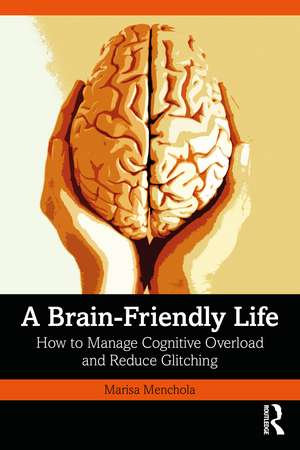A Brain-Friendly Life: How to Manage Cognitive Overload and Reduce Glitching
Autor Marisa Mencholaen Limba Engleză Paperback – 23 oct 2024
Menchola draws on her experience as a clinical neuropsychologist who has worked with a widely diverse group of patients, to translate the findings from highly controlled research into concrete strategies that people can implement in their messy worlds to make their days more brain-friendly. The book also provides advice on how to address those factors that drain our brain resources, and gives guidance on when and how to seek a neuropsychological evaluation.
It is valuable reading for anyone experiencing frustrating cognitive problems that are not due to brain disease. It is also essential for neuropsychologists, psychologists and physicians in primary care, psychiatry, and neurology, who need a resource to offer to patients to help their healthy brains function better.
| Toate formatele și edițiile | Preț | Express |
|---|---|---|
| Paperback (1) | 146.30 lei 3-5 săpt. | +11.47 lei 4-10 zile |
| Taylor & Francis – 23 oct 2024 | 146.30 lei 3-5 săpt. | +11.47 lei 4-10 zile |
| Hardback (1) | 891.85 lei 6-8 săpt. | |
| Taylor & Francis – 23 oct 2024 | 891.85 lei 6-8 săpt. |
Preț: 146.30 lei
Nou
Puncte Express: 219
Preț estimativ în valută:
27.100€ • 29.12$ • 23.11£
27.100€ • 29.12$ • 23.11£
Carte disponibilă
Livrare economică 24 martie-07 aprilie
Livrare express 07-13 martie pentru 21.46 lei
Preluare comenzi: 021 569.72.76
Specificații
ISBN-13: 9781032529400
ISBN-10: 1032529407
Pagini: 208
Ilustrații: 8
Dimensiuni: 156 x 234 x 15 mm
Greutate: 0.3 kg
Ediția:1
Editura: Taylor & Francis
Colecția Routledge
Locul publicării:Oxford, United Kingdom
ISBN-10: 1032529407
Pagini: 208
Ilustrații: 8
Dimensiuni: 156 x 234 x 15 mm
Greutate: 0.3 kg
Ediția:1
Editura: Taylor & Francis
Colecția Routledge
Locul publicării:Oxford, United Kingdom
Public țintă
GeneralCuprins
Introduction: Depleted Brains in a Demanding World. Part I: Why we glitch. Chapter 1: How our brain works. Chapter 2: Neurocognitive disorders. Chapter 3: A brain-unfriendly life. Part II: Tending to our depleted brains.
Chapter 4: Chronic stress. Chapter 5: Mental health. Chapter 6: Medical conditions. Chapter 7: Sleep. Chapter 8: Substance use. Chapter 9: The aging brain. Part III: Decreasing cognitive overload. Chapter 10: Life. Chapter 11: Slowing down. Chapter 12: Hitting pause. Chapter 13: Taming our attention. Chapter 14: Outsourcing mental tasks. Chapter 15: Minimizing multitasking. Chapter 16: Containing worry.
Chapter 17: Befriending our emotions. Chapter 18: Transforming our thoughts. Chapter 19: Back to the body.
Chapter 20: Sparking alertness. Chapter 21: Reclaiming our time. Parting Thoughts: Looking Upstream. Appendix: Seeking Help: The Evaluation Process.
Chapter 4: Chronic stress. Chapter 5: Mental health. Chapter 6: Medical conditions. Chapter 7: Sleep. Chapter 8: Substance use. Chapter 9: The aging brain. Part III: Decreasing cognitive overload. Chapter 10: Life. Chapter 11: Slowing down. Chapter 12: Hitting pause. Chapter 13: Taming our attention. Chapter 14: Outsourcing mental tasks. Chapter 15: Minimizing multitasking. Chapter 16: Containing worry.
Chapter 17: Befriending our emotions. Chapter 18: Transforming our thoughts. Chapter 19: Back to the body.
Chapter 20: Sparking alertness. Chapter 21: Reclaiming our time. Parting Thoughts: Looking Upstream. Appendix: Seeking Help: The Evaluation Process.
Notă biografică
Marisa Menchola is a board-certified clinical neuropsychologist and Associate Professor in the Clinical Psychology Program at Midwestern University in Glendale, Arizona (United States). She also has a forensic private practice and consulting office in Tucson, Arizona.
Descriere
Menchola draws on her experience as a clinical neuropsychologist who has worked with a widely diverse group of patients, to translate the findings from highly controlled research into concrete strategies that people can implement in their messy worlds to make their days more brain-friendly.
